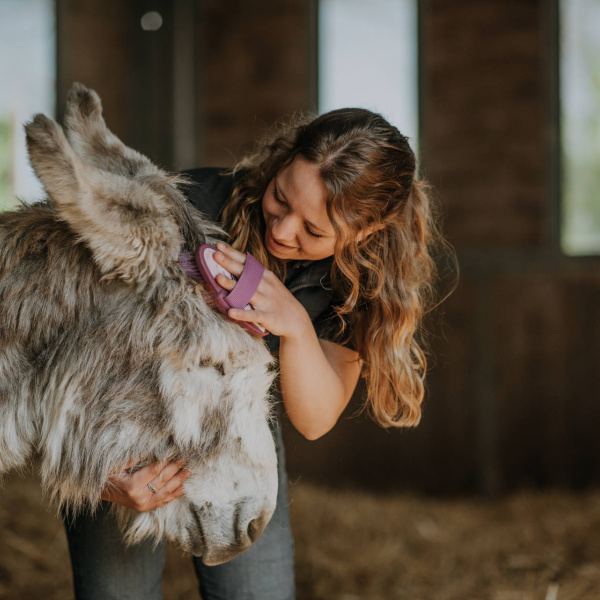Donkeys are one of Britain's favourite animals, despite more than half of people wrongly believing they are stubborn, a study has revealed.
A YouGov poll for international animal welfare charity The Donkey Sanctuary found that donkeys were Britain's second favourite farm animal.
Unlike horses, who topped the poll with (24%), donkeys (17%) are not native to Europe, yet the British public still hold these loyal and affectionate animals close to their hearts. Donkeys have long suffered an unfair reputation and this was borne out in the poll results with 55% of people quizzed, wrongly believing they were stubborn. But donkeys are highly intelligent animals, The Donkey Sanctuary's Animal Behaviourist Ben Hart explains: "The donkeys' stoic nature means when compared to horses, they show more subtle body language when in pain or distress. Donkeys also have a strong sense of self-preservation and are unwilling to do things that they perceive as dangerous.
"The donkeys' stoic nature, minimal body language, and their natural propensity to freeze when threatened or frightened, combined with a reluctance to put themselves at risk, results in donkeys commonly being mislabelled as stupid or stubborn. I believe anyone that calls a donkey stupid, has simply been outsmarted by one!"
Encouragingly, the research also found that 89% of people are aware that donkeys carry out an important role in helping communities around the world.
A Donkey Sanctuary report published in November 2019 stated that 500 million people in the world's poorest communities still rely on working donkeys as a lifeline to support their livelihoods.
In Nepal donkeys play a critical role working alongside communities to produce six billion bricks that are then used throughout the world in the construction industry, and in the rural areas of Ethiopia, where donkeys are used in farming and transportation.
Dr Faith Burden, Executive Director of Equine Operations at The Donkey Sanctuary said: "It's great to hear that people understand just how important donkeys are. Owning a working donkey means survival for some of the poorest and most vulnerable communities in the world. They enable their owners to participate in work and boost economic capacity.
"They help enable children to receive an education and help promote gender equality by allowing women to be economically active. The role of these hardworking animals is vital and their status should never be underplayed."
The Donkey Sanctuary will be launching a myth busting campaign called #donkeysdebunked on the August Bank Holiday to champion these gentle, intelligent and hardworking animals and help reverse their unfair reputation for being stubborn.
The Donkey Sanctuary is a global leader for equine welfare, research and veterinary care. The charity operates programmes worldwide for animals working in agriculture, industry and transportation.
#donkeysdebunked will be launched on https://www.facebook.com/TheDonkeySanctuary and https://www.thedonkeysanctuary.org.uk/.
All figures, unless otherwise stated, are from YouGov Plc. Total sample size was 2101 adults. Fieldwork was undertaken between 10 - 11 March 2020. The survey was carried out online. The figures have been weighted and are representative of all GB adults (aged 18+).
For interviews, images and information please contact The Donkey Sanctuary press office on 01395 573124 or 07870 849563 (including out of hours) or send an email.
The Donkey Sanctuary is the world's largest equine welfare charity. Our vision is a world where donkeys and mules live free from suffering and their contribution to humanity is fully valued. We run 10 sanctuaries around the UK and Europe, giving lifelong care to more than 7,000 donkeys and mules. Our hospital treats sick donkeys and trains vets both nationwide and worldwide. Our donkey-facilitated learning programme helps vulnerable children and adults develop life skills by connecting with donkeys on an emotional and physical level. The charity operates programmes worldwide for animals working in agriculture, industry and transportation, and those used in the production of meat and skin.
